Batteries are tricky contraptions sometimes; one minute they hold a perfect charge, and the next, they are empty when you need them most, like just before you leave for work. Happily, devices like Battery Tenders can stave off this problem and keep you rolling.
Battery chargers and maintainers are much like a combination of jumper cable and phone charger, as they plug into the wall and slowly charge a battery over a period of time. They’re also intelligent enough to know when to reduce or completely stop the flow of power to keep the battery safe.
While these three Battery Tenders/chargers all do the same job, they have different attributes that make them individuals. In this review, we will look at all three chargers and recommend the best one.
AT A GLANCE: QUICK COMPARISON OF BATTERY TENDER 1.25A, 4A, AND 5A
 Battery Tender 1.25A | 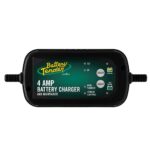 Battery Tender 4A | 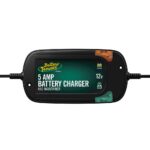 Battery Tender 5A |
|
|---|---|---|---|
| Customer Rating |  |  |  |
| Price |  |  |  |
| Charging current | 1.25A | 4A | 5A |
| Type of charger | 4 step, fully automatic | 4 step, fully automatic | 4 step, fully automatic |
| Supported vehicles | Power sport vehicles and motorbike | Power sport, automotive, marine vehicles | Power sport, automotive, marine vehicles |
| Reverse polarity protection | ✔ | ✔ | ✔ |
| Overcharging prevention | ✔ | ✔ | ✔ |
| Ability to charge car batteries | -- | ✔ | ✔ |
| Charge 12V Lithium batteries | -- | ✔ | -- |
| Reconditioning function | -- | ✔ | -- |
| Thermal compensation | ✔ | -- | -- |
| Pros | + Can charge power sport vehicles + Small overall size + Thermal Compensation + Reasonable price | + Can charge both 6 and 12-volt battery systems + Can charge and maintain car batteries + Small overall size | + Powerful enough to charge and maintain car and RV batteries + Designed with lower energy consumption + Allow faster charging |
| Cons | - Cannot charge a car battery | - No temperature sensitive charging control | - Cannot revive deeply discharged batteries |
| Warranty | 5 years | 5 years | 5 years |
| Score | 9.5 | 9.5 | 8 |
Battery Tender 1.25A, 4A & 5A: What Are Similarities?
Each charger has the goal of charging/maintaining your battery, so common features are inevitable. Safety, durability, and longevity features are common across all three chargers.
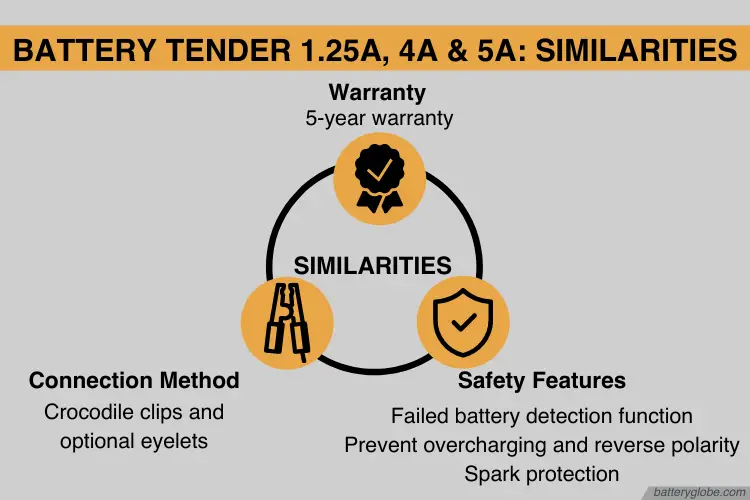
2 Connection Methods
The connection method for each charger is the same: crocodile clips and optional eyelets.
If you want to leave them connected to the battery, run the leads through the grille and plug in without having to open the hood every time, or run them through complicated bodywork on offroad equipment.
Safety Features
Each charger has features to prevent overcharging and reverse polarity, which occurs when the clips are hooked up in the wrong order. If they are, then the charger simply does not deliver any power, to avoid damaging the battery.
Each charger also has a feature to prevent overcharging, in essence, “float” charging, where the charger maintains a full or near full charge level.
All three trickle chargers have the ability to detect when a battery is too damaged to be safely recharged or reused, and will flash a light to let you know the battery is no longer safe to use in any capacity.
These chargers also feature sealed cases to protect against spills and dust, along with spark protection. This is important as cars feature flammable liquids that occasionally leak. Still, do not use the charger near flammable liquids if possible.
5-Year Warranty
All three chargers come from Battery Tender with a factory 5-year warranty.
What Are The Key Differences?
Battery Tenders overall serve exactly the same purpose, regardless of charging voltage or case style. We’ve addressed common features and attributes that each Battery Tender shares, and now we move to the differences they have.

Supported Vehicles/Batteries
Unfortunately, the Battery Tender 1.25A cannot charge anything larger than an ATV battery. You can use it to maintain the car battery, but do not expect it to charge it.
The Battery Tender 4 Amp can charge both 6 and 12 volt systems and is powerful enough to charge a car. If you can only have one charger out of this trio, it will be this one.
Finally, the Battery Tender 5 Amp is powerful enough to charge a car battery or maintain an RV battery but can only charge 12 volt systems.
If you only need a charger for your equipment like ATV’s, motorcycles, and various outdoor toys, then the Battery Plus 1.25A will serve you well. But for charging something larger, you will want the Tender 4A or even 5A.
Battery Tender 4A With Ability to Charge 6 Volt Systems
While all three chargers can charge 12 volt systems, only the Battery Tender 4A can handle both 12 and 6 volt systems, although not at the same time. This is especially useful as it means you will only need one charger for all your vehicular charging needs; motorcycle, auto, or marine.
Design
As all three chargers come from the same manufacturer and are from the same model line, they all look identical. Battery chargers and maintainers all look quite similar anyway, and the Battery Tender lineup we have here is no different.
Still, the Battery Tender 1.25A measures at 9x4x11 inches, the Battery Tender 4A comes in at 69.×3.33×1.91 inches, and, finally, the Battery Tender 5A is measured at 8.2×3.9×2.3 inches.
The Battery Tender 4A is the group’s heavyweight, weighing in at 2.52 pounds, while the Battery Tender 5A and 1.25A weigh 1.45 and 1.25 pounds, respectively.
Additional Features
Unfortunately, none of these chargers is capable of reconditioning a dead battery to make it last longer. Additionally, none of the three can function as a secondary power source; they only charge and maintain batteries.
However, the Battery Tender 1.25A Plus comes with a Thermal Compensation feature that lowers or raises charging voltage, depending on the external temperature. This is a handy feature if you live in a climate with big temperature swings.
Which Battery Tender Should You Buy?
Battery Tender 1.25A: An affordable investment for maintaining your vehicle batteries in the pandemic
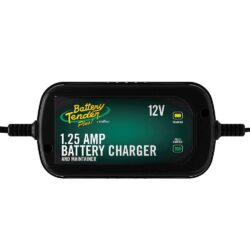
Pros
- Can charge power sport vehicles (boats, etc.)
- Small overall size
- Afforadable price at around $50
- Thermal Compensation feature
Cons
- Not powerful enough to charge a car battery
The Battery Tender 1.25A is a solid charger but not powerful enough to charge a car battery and lacks some smart charging features. It is a good charger, but consider other options before buying.
However, it does work well as a maintainer, which, in a pandemic, is a very useful option in cases where cars do not get driven for long periods.
Battery Tender 4A: This versatile item will pay for itself in no time
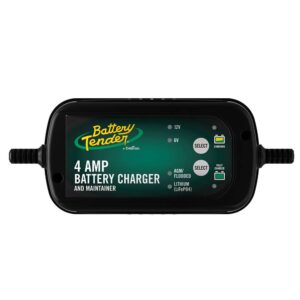
Pros
- Can charge both 6 and 12-volt battery systems
- Powerful enough to charge and maintain car batteries
- Charge 12V Lithium batteries
- Small overall size
Cons
- No temperature sensitive charging control
The Battery Tender 4A is a solid charger with plenty of features and the ability to charge both 6 and 12 volt systems. If you have to have only one charger around the property, this is an excellent choice.
Battery Tender 5A: An upgraded version of Battery Tender Junior
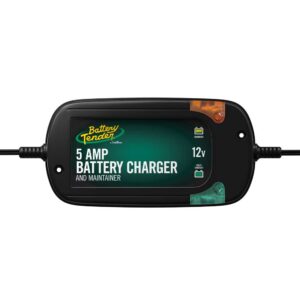
Pros
- Powerful enough to charge and maintain car and RV batteries
- Allow faster charging of larger batteries without overcharging them
- It’s an energy efficient version
Cons
- Cannot charge 6 volt systems
- No temperature sensor
The Battery Tender 5A is the charger to have if you need to charge car batteries and have larger equipment that needs to have its batteries maintained over a while. This is the charger to have, but remember that it cannot charge 6 volt systems.
FAQs
What types of batteries can I charge?
- Battery Tender 1.25A: Can charge any small 12-volt battery, such as an ATV battery or motorcycle battery, but can only maintain a charge on a car battery.
- Battery Tender 4A: Can both charge and maintain any 6 or 12-volt battery, up to an RV-size vehicle.
- Battery Tender 5A: Can charge and maintain any size 12-volt battery up to an RV-size vehicle.
Are these Tender chargers waterproof?
To a point. They will be fine if you accidentally spill a few drops of water on them or carry it from one building to another in the rain, but they will not survive being completely submerged.
Can I leave the eyelets on the battery?
Depending on how often you like to charge or maintain the battery, you can leave the eyelets connected to the terminals, even when the charger is not hooked up, and they will be okay.
